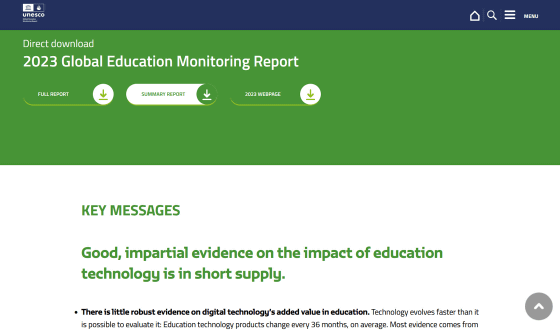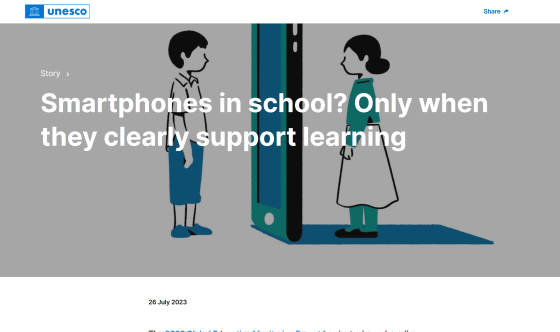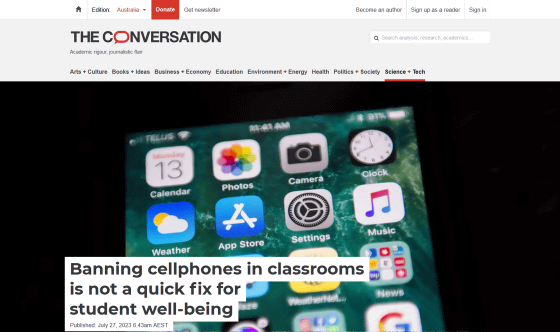UNESCO announces a report calling for ``the use of electronic devices and online content in schools should be considered more appropriately''

UNESCO, an international
Home - 2023 GEM Report
https://gem-report-2023.unesco.org/

UNESCO issues urgent call for appropriate use of technology in education | Global Education Monitoring Report
https://www.unesco.org/gem-report/en/articles/unesco-issues-urgent-call-appropriate-use-technology-education
In July 2023, UNESCO released the 2023 Global Education Monitoring Report, which analyzes the use of technology in education. In this context, UNESCO believes that the adoption of digital technology in educational settings has improved access to digital literature and has had a positive effect on some educational curricula. I admit there is. However, he also pointed out that much of the research showing the benefits of technology adoption in education was funded by industry, and the evidence was uneven.
In Peru, although laptops were distributed to students without being incorporated into an appropriate educational curriculum, learning did not improve. In addition, an analysis of more than 2 million students in the United States also found that learning gaps widened when learning was done remotely only, UNESCO said. In order to utilize technology in the classroom, it is essential to prepare not only students but also teachers, but it seems that only about half of the countries have standards for developing information technology skills for teachers.
90% of higher education repositories with open educational resources are created in Europe and North America, and 92% of the content in the global library of open educational resources (OER) is in English. UNESCO points out that it is a problem in terms of At least 500 million children around the world do not have the necessary environment for online education, and it is also a problem that inequality in Internet access hinders the right to receive education.
Audrey Azoulay , Director-General of UNESCO, said: 'The digital revolution holds immense potential, but the way we use digital in education will be challenged, as some warn about how society is regulated. should be given similar attention, and their use should be for the enhancement of the learning experience and for the well-being of students and teachers, and not to the detriment of learning. It should put the needs of students first and support teachers. Online connections are not a substitute for human interaction.'

UNESCO also mentions the use of electronic devices, including smartphones, in schools. According to UNESCO, a study that investigated pre-school to higher education in 14 countries around the world found that students lost concentration just by having a smartphone nearby. A 2018 study of American college students also showed that students' grades declined just by being allowed to use electronic devices such as smartphones, laptops, and tablets.
Smartphones in school? Only when they clearly support learning | UNESCO
https://www.unesco.org/en/articles/smartphones-school-only-when-they-clearly-support-learning

In addition, UNESCO points out that only 16% of countries explicitly guarantee data privacy in education, and online education also risks infringing on children's privacy. According to UNESCO, a quarter of the countries in the world have banned the use of smartphones in schools.
In response to UNESCO's report, major media such as The Guardian reported that ``UNESCO has called for banning the use of smartphones in schools.'' However, some people have pointed out that these reports are overly simplistic, focusing only on the risks of smartphones.
Banning cellphones in classrooms is not a quick fix for student well-being
https://theconversation.com/banning-cellphones-in-classrooms-is-not-a-quick-fix-for-student-well-being-210178

A global ban on smartphones in schools - do we need more evidence? - University of Birmingham
https://www.birmingham.ac.uk/news/2023/a-global-ban-on-smartphones-in-schools-do-we-need-more-evidence-1
Lana Parker, an associate professor of education at the University of Windsor in Canada, said, ``Despite UNESCO's many nuanced recommendations, some media outlets say 'UNESCO bans smartphone use in schools. That is why governments call for the simplest but ineffective solution of banning smartphones in schools as the one and only one-size-fits-all approach. It's dangerous,' he warned.
Parker points out that modern young people enjoy both advantages and disadvantages from online connections, and that simply banning smartphone use cannot deal with the complex modern environment. “Solutions to addressing online engagement ignore how young people engage with these spaces outside of school and how prevalent online lives are for young people’s identity building. It should not be done,” Parker said.
Related Posts:
in Web Service, Hardware, Posted by log1h_ik







